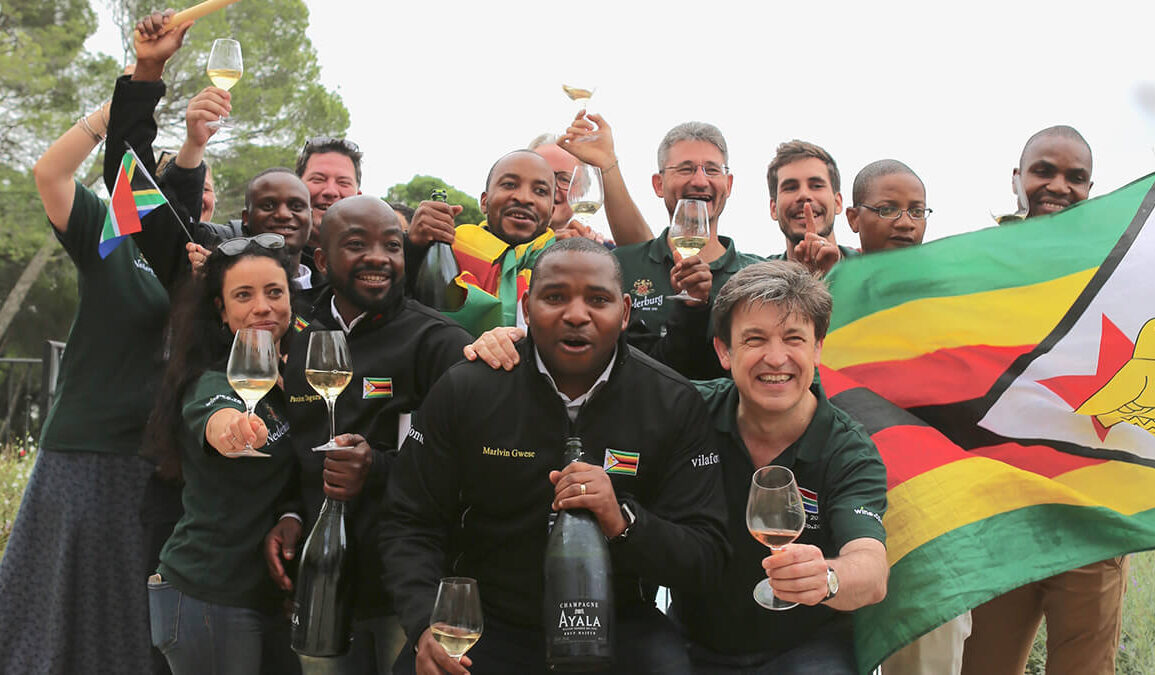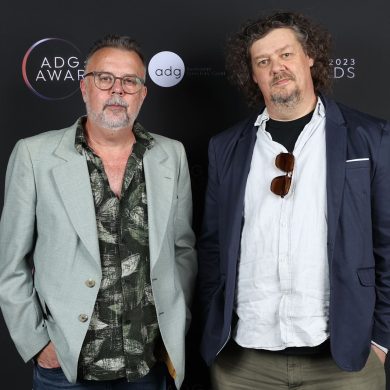Thank you both for joining me to discuss your film. It’s a beautiful film. I really enjoyed Red Obsession too, which I thought was a really wonderful film. I’m not a wine drinker, so I find these kinds of films really fascinating and enjoyable, because my family is really heavily into wine. At least now I have conversation starters to be able to go “Brilliant, I know this about wine.” And Blind Ambition gave me a little bit more to be able to go “Ah yeah, I know how to pronounce that now.” Are you both wine drinkers, big fans of wine?
Warwick Ross
Which makes me a very big drinker. (laughs)
Robert Coe
I’m a big fan of wine and a big drinker. But Warwick goes a step beyond this.
(laughs) Where did your interest in wine start?
Warwick Ross
Ah, gosh, yeah, I haven’t been asked that for a long time. I was actually a non-drinker completely when I was younger through university, never drank a drop. And then I think it was something about getting involved in the film industry which I’ve been in for thirty-five — more than that — years. There’s something about alcohol and film that go very well together. I think the film industry kicked off my interest in alcohol which then sort of skewed more wine, thank God, instead of hard liquor. So that’s really where it began and then as time went on, more and more and more interest until I eventually planted my own vineyard on the Mornington Peninsula down in Victoria. And so I’m a vintner and a filmmaker at the same time.
I was going to ask about that gap in your filmography. There’s the Yahoo Serious films, and then all of a sudden Red Obsession. I’m like, where has he been all this time, what’s he been doing? So that makes sense.
Warwick Ross
It takes a long time to plant 23,500 vines.
At least you’re coming from an informed perspective. You’ve both produced some really interesting films. Rob, I’m a big fan of Beast, I thought that Beast is a bit of an undervalued film. Of course, I just mentioned the Yahoo Serious films. And then we’re heading into this journey into these wine documentaries, which is so different. For both of you, was it the stories that were in these films that were more interesting? Or “Look, this is a story about wine, we know there is an audience for stories about wine”?
Robert Coe
For me, it was definitely there’s something interesting in this story. And it was just lucky that it was in the world of wine. I think after Red Obsession, Warwick and I were always looking for another story in the wine world because it was so much fun. But we weren’t just going to tell any story. It had to be really special for us to want to go and do it. And when we came across the story through Jancis Robinson, the master of wine out of the UK via our associate producer Andrew Caillard, like “Here’s a story for Warwick and Rob, it’s about these four Zimbabweans.” It was like (snaps fingers) “Done. Let’s talk to them. We need to Skype these guys immediately and see what’s happening.”
It was that initial excitement about these four guys who were trying to break barriers and break into an industry that they never been to that was a bit of a hook for us. But what really sank it in was when we spoke to the guys initially on Zoom. They were just such fascinating guys, they were so different. One was the philosopher, one was the joker, one was a serious guy, and they weren’t all uniform. And they had great rapport. There was a good foundation for storytelling there. And I guess we did have to take a bit of a risk by just jumping in and seeing where would they go? Definitely, you know, glad that it was in the world of wine, because it’s so much fun. And it is a world that we know, but very much driven by story, first and foremost.
Warwick Ross
I think also just dealing with something real. I’ve been involved with scripted features for a very long time, but the step into documentary was one that was just so satisfying with Red Obsession. We felt that to have people input on a real story as things were unfolding was sort of more compelling really than then then spending time on a set day in day out doing, you know, one scene, two scenes from a script. This was also completely unpredictable. Documentary by its very nature is something you don’t control. And I think there’s something very exciting about that as well. Because you never quite know where you’re going with it. You grab hold of a story and then you hold on and let it take you.
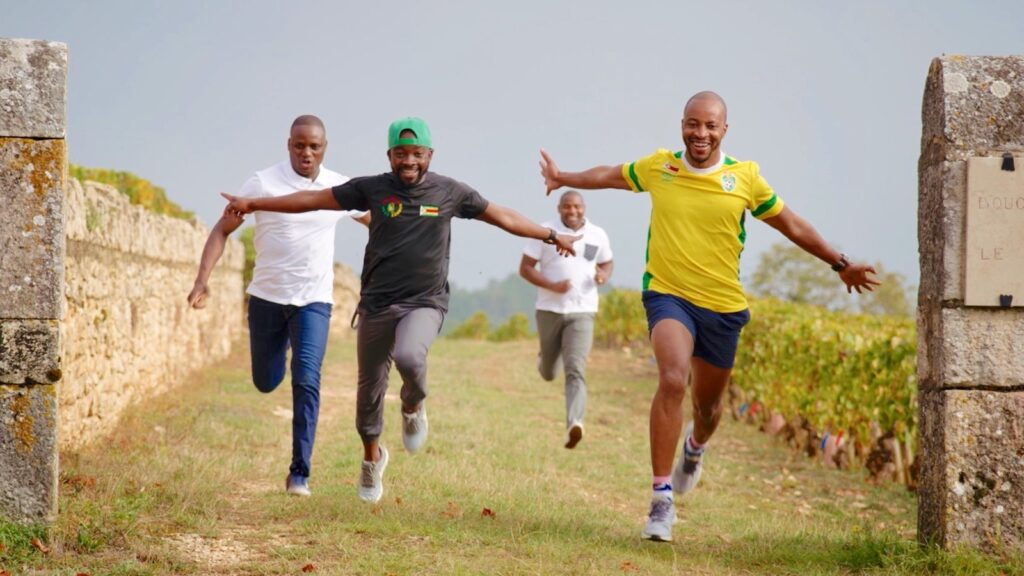

With the story that is being billed as the Wine Olympics, there is this real sports tone to it which has that competition vibe. You don’t know where it’s going to go, you don’t know if they’re going to win, if they’re going to lose. What’s that like for you as filmmakers just sitting back and watching this journey take place? There are moments where it feels like a freefall as well, especially when they head over to Europe and they employ this really larger than life guy to coach them along? What’s it like sitting on the sidelines and just watching all this take place?
Robert Coe
It was exhilarating and frustrating at the same time. The very first time we filmed the guys together was at the barbecue. So it was lucky that chronologically in the film, that was actually one of the first scenes to occur, because it was also the first that we shot. And being able to film that and get a sense of how they operated and worked and see Tinashe guess the wine right, that kind of blew our minds. We were like, “Oh wow, these guys are actually really good.”
You sort of jump in and go “They’re gonna win this thing,” and you’ve only just started to getting to know them and filming them. But along the way, we realised that these elements of chaos with Denis, that was great for the drama, what was going to drive us through the second act. With how they were going, they definitely had their ups and downs. The rigorous tour that we did through all those places was exhausting. I mean, we were exhausted and we were getting up at the same time, going to bed at the same time as them.
And we were thinking “How are they going to be able to perform well when they’re going to be so exhausted?” You know, concern about that, concern about Denny at the actual competition. So it really was a wild ride that had us constantly shifting as we were going along, you know, in our heads rewriting, like “This is how it would go or this or maybe that way.” But ultimately, we were so thankful for a lot of the drama that did unfold, and it helped push along the story.
You’re on the edge of your seat at times. And the brilliance of this is there are heroes and there are villains. And the main characters are just so enjoyable to spend time with and they’re larger than life. And they’re also really into their wine. What I love is, as somebody who only really understands wine from the kind of perspective of sniffing it and then tasting it, not actually drinking it as such, but understanding there’s ‘a bit of this and there is a bit of that’ in there, I didn’t realise that it’s like a puzzle. This is really just like a puzzle, finding out exactly where things are from. Did you get to experience that kind of puzzle narrative watching this take place? And did you get to taste the wines while you were actually filming? Obviously, you’ve got to try and stay as sober as possible. Did you get to experience the lock opening moment that they got to experience?
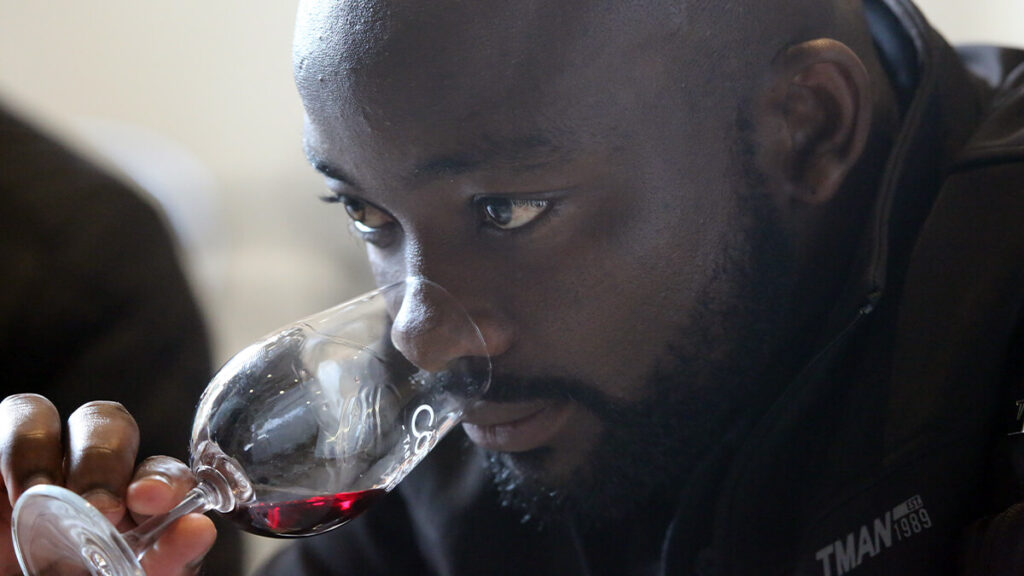

Warwick Ross
Yeah, we did. But we play this game ourselves a lot. So I’ll pull out a wine at dinner one night. There might be eight or ten of us around the table. Nobody knows what it is and you pour it and people have to start guessing. And often the first question is, is it old world or is it new world? That’s often one of the basic questions. So you’re trying to determine if it’s from someplace in Europe, mainly Europe. Or new world meaning South Africa, Australia, New Zealand, the United States. And there are distinctive differences between wines that are made in those places. You’re struggling with the varietals.
So is this a Pinot Noir? Or could it be Gamay? It’s probably not a Cab Sav. It’s not as big and bold as a Cab Sav. It’s not as tannic. So you look for those clues. And there’s a lot of satisfaction if you get close. I mean, as somebody says in the film, it’s almost impossible to nail it exactly. But to get kind of close is really satisfying. It’s a great game to play.
Australia is notoriously a wine-loving nation. So it seems like something that I think that more people would really take on board, especially after watching this film. And I hope it becomes a success, because this is the kind of film that is a real conversation starter. One of the aspects which I really liked is that it doesn’t shy away from the reality of where these guys have come from. This is not only just a wine story, but it is equally a refugee story. How important was it for you to showcase the journeys that they all took to getting to South Africa?
Warwick Ross
Look, it was really important for us that everybody understood the journey that they had taken. Ostensibly, this is a story of four guys going into a competition. And we knew it was more than that. But the question is, can you reveal that? You know, can you make an audience see what is deeper, what the levels are below that surface. Talking with the four guys one at a time and hearing their stories of hardship, of fleeing across the border from the repression of Robert Mugabe, arriving in a place that they thought would be a safe place, meaning South Africa, a place that they thought would have opportunities, was fraught as well. There was discrimination, xenophobic attacks, they suffered starvation. So they put up with a lot just to survive, let alone become familiar as this, let alone go to this international competition.
The hurdles that these guys had to get past were hurdles that generally nobody else has to overcome before you can enter this world of wine-tasting. There were racial barriers. There were religious barriers, financial barriers, cultural. They weren’t meant to be in a business that serves alcohol. You know, they’re Pentecostal Christians. Alcohol is not allowed as one of the characters says in the film. And some of the guys actually needed permission from their parents. And the question from the parents back was, “Do you think this is God’s calling that you enter this career path?” “Yes, I think it’s God’s calling.” And that’s how they entered this world.
They started a long way behind everybody else. Zimbabwe has no wine culture to speak of. To become a sommelier is one thing, but to decide to challenge at the World Championships against twenty-three other nations, all of whom are white – if you looked at the faces in that competition, they’re white faces from one side to the other. And only at our table, at the Zimbabwean table are there Black guys, four Black guys competing. This was groundbreaking, just groundbreaking, so it was not so much about the competition, it was all those other things which were extremely important.
Robert Coe
I think the guys themselves are undeniably fun. They are really fun guys. And we approached Blind Ambition with… there is a way to convey that levity in the film. But without showing where they’ve come from and what they have endured, you don’t get that weight that the film needs to carry where the story is really powerful. And so it was really important for us to make sure that we addressed those and people understood exactly where they’ve come from, what they’ve gone through, and the amazing outlook on life they had now. I’ve never met more optimistic people than they were despite what they’ve endured, and especially the fact that they still love Zimbabwe. All they want to do is go home and work and live in Zimbabwe, which is remarkable.
What I love about this is that this is an Australian film, you’re Australian filmmakers and you’re creating something that is a story that is about not Australian stories. There is a global aspect to Blind Ambition, there is a united global aspect to a) wine; and b) refugees. The people of Africa and Europe and all these different places coming together to celebrate something as a united force. I’m curious for you: the identity of this film – does it matter? Or do you see it as a global film? Do you see it as an Australian film? Or do you see it as a global film?
Warwick Ross
I think I think as Australians, we’re very proud that it’s an Australian film. But I think it shows the evolution of these Australian film industry, that Australians can tell stories that are not always about Australian subjects. I mean, the world seems to be getting smaller and smaller all the time. And Australians are very good at observing and seeing what is happening with the world and being able to find those stories and to be able to tell them. So I think it’s a maturing of the industry that we can do this. I mean, you would even say Baz Luhrmann – he did Gatsby, and it’s certainly not an Australian story, by any means. But there’s a perspective that he brings to that as well. So I think it’s a very important thing that it’s recognised Australians can tell stories of a global nature.
Last year was a really turbulent time for Australian film industry and one of the things that was almost on the chopping block was the Gallipoli clause. How important was that for making a film like Blind Ambition and telling these kinds of global stories? For you as producers and directors, how important has that been to have that clause there?
Robert Coe
I mean, for us personally and I think for the broader industry, it’s vital to be able to take a leap and attempt to tell these stories. And these stories ultimately may be told by Australians about maybe non-Australian subjects. They are universal themes that resonate with everyone. And I think that that’s important that we don’t restrict ourselves to just being too introverted with our storytelling. It is vital that we tell Australian stories, no doubt.
The Gallipoli Clause allows us to take that extra jump and dive into the unknown and explore worlds we don’t normally explore. I mean, one of the reasons that we make documentaries is to provide a window into a world that people don’t normally see. And you can’t pick a more bizarre window that we’ve chosen for this one. We ourselves thought that it was bizarre. So I think that we’re incredibly grateful to Screen Australia and the support that they provided to this film. But in terms of the producer offset, the Gallipoli clause is something that we probably wouldn’t have been able to make film without. That’s true.
And for you, Warwick, obviously the changes throughout the years in the film industry, what have you seen change and evolve with the industry? And where do you see it going?
Warwick Ross
I think the Australian industry has always been very dependent on on government funding to one degree or another. And people will argue that 10BA when it was first brought in was wonderful, because it created a sort of a flowering of the industry. It allowed people to make all these films at the same time. There were tax advantages to people. So a lot of films got made that maybe shouldn’t have seen the light of day because the investors were doing better than had they had paid tax. They were doing much better. So it didn’t matter if the film worked or it didn’t work.
But I think that’s the price you pay for the other films that do get made that are worthwhile making. And if we didn’t have the level of government support that we have had in the past, and it’s had its rises and falls, of course, and you’ve seen the results of that as well. But the industry relies heavily on some sort of subsidy to be able to tell these stories. And I think it’s really important that the government recognises that and continues doing this sort of thing.
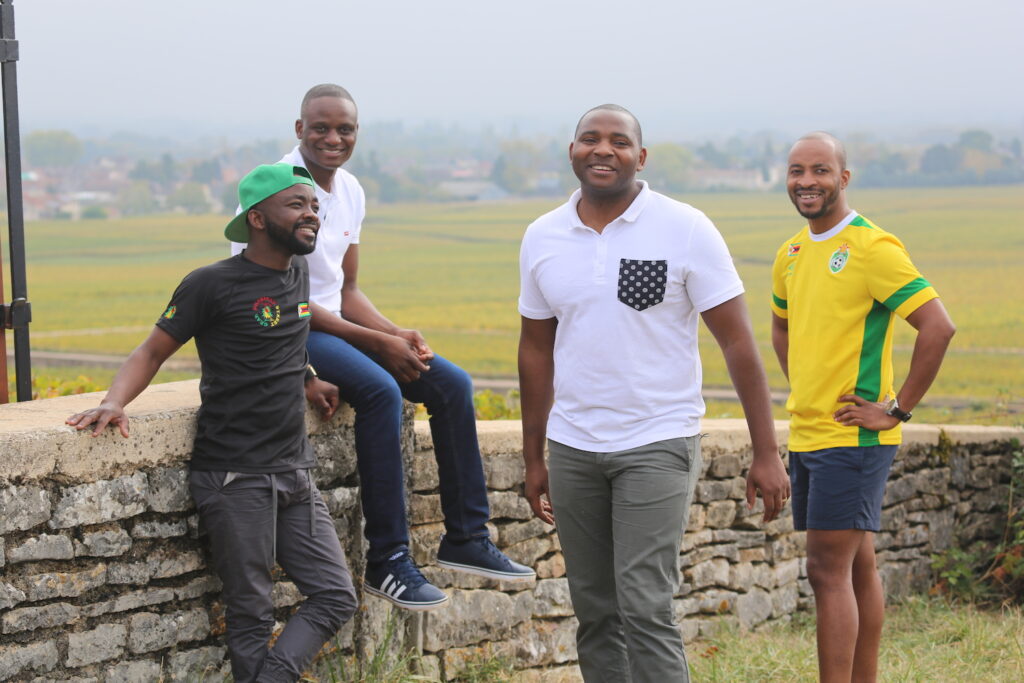

I agree. Because we get to see these beautiful films. I think of your films, I think of Jennifer Peedom’s films and I think of so many different filmmakers who tell these stories from an Australian perspective about the world. And being a little bit selfish, they help inform my perspective of Australia a little bit more. And that’s what I love about watching these films because I get to reflect on our relationship with wine, our relationship with refugees, and how we treat these different entities and these different people here at home and makes me wish “Oh, we should probably do something more here or do something more.” Is that the hope for you as filmmakers to have people reflect on not only the story but themselves and their lives?
Robert Coe
Definitely. I think that ultimately as filmmakers, we start off and we have visions for the stories that we want to tell. But knowing the idiosyncrasies of all individuals, there’s just this notion that people always project. And I love that. And I love talking to people after they’ve watched the film and understanding their view of it and what they took away. And that actually really makes the process so rich, you know, for us to be able to tell a story, for it to be interpreted multiple different ways, or people pick up on elements. There’s never a right or wrong answer in film. We have an idea of what story we want to tell, and then the fact that people interpret it differently, that’s just wonderful. And I love that aspect.
Warwick Ross
I agree. Just to finish off, I was just going to say that the takeaway for us for this film that we’ve made is, and one of our characters says, “Some of the world’s most wonderful minds don’t fit where we think they should be, where we think they should go.” And if anything, if there’s any takeaway, it’s to be open to the rewards that will come with inclusion and diversity. I think that’s — we felt that very strongly through the making of this film.
Well, I think it’s a brilliant film. You both deserve all the accolades and congratulations, and it’s one that I look forward to getting behind and supporting and championing because I’ve watched Red Obsession, and this one is a continuation of it. I’m hoping that we get to see more wine stories from you.
Warwick Ross
(laughs)
Robert Coe
(laughs) Thanks, Andrew.

